Agriculture
SOURSOP INDUSTRY IN GRENADA IS THRIVING ANF ROBUST

Grenada takes firm action to safeguard and develop its USD 2.6 million soursop industry
The island aims to increase capacity of the industry and explore new export markets
Launched on April 18, 2024, a three-year project entitled, “Enhancing Sanitary and Phytosanitary Measures (SPS) capacity and market access for Grenadian soursop exports” aims to help the country enhance its industry traceability and surveillance systems, as well as the soursop industry’s ability to manage future pest risks and investigate potential diversification into new markets. The project will be carried out by the Food and Agriculture Organization of the United Nations (FAO) and is funded in collaboration with the Ministry of Agriculture & Lands, Forestry, Marine Resources & Cooperatives in Grenada and The Standards and Trade Development Facility (STDF) of the World Trade Organization based in Geneva, Switzerland.
With a projected annual value of US 2.6 million, the soursop industry in Grenada is thriving and robust with the United States of America (USA) as its main export market. The lack of two pests—the fruit borer and the seed borer allows the island to have advantageous access to this market. Additionally, due to the large number of immigrant communities in the USA, soursop has become more popular over the years.
Equally important is an estimated 2,600 farmers, most of them being small-scale farmers, who rely on soursop for their livelihood with farming as their primary source of income. Due to the industry’s significant earnings and potential for further expansion, increasing soursop production and export has been given priority in Grenada’s National Sustainable Development Plan 2020–2035. This has led to the collaboration between the Food and Agriculture Organization of the United Nations (FAO) and the Ministry of Agriculture and Lands, Fisheries, and Cooperatives.
The launch of this project was attended by 30 participants including officials from the Ministry of Agriculture as well as other stakeholders. During the workshop, several key project topics were discussed including developing a holistic surveillance programme and emergency response, strengthening the capacities of government institutions on monitoring, detection, response, certification and traceability systems, and strengthening the Integrated Pest Management (IPM) for famers, private sector and extension services. The workshop also focused on boosting the soursop industry to manage future risks and expand market access.
In offering remarks at the workshop, Dr Renata Clarke, FAO’s Sub-regional Coordinator stated, “The Standards and Trade Development Facility’s financial contribution is more than matched by the government’s own contribution. I have been hearing about the programs of the government to support extension and outreach to farmers so that they can implement good practices. It is also matched by FAO’s past and ongoing support to the soursop value chain. So, all the partners have skin in the game. In closing, I am counting on the government and on you national stakeholders to make this an exemplary project. Many eyes will be on you. Your partners STDF and FAO will be supporting you throughout and I look forward to sharing the satisfaction for a job well done at the end”.
Meanwhile, Catalina Pulido, STDF’s Economic Affairs Officer highlighted that this is the first project that her organization will finance in Grenada. She indicated, “Lessons learned are expected to be disseminated within the Caribbean and other regions and applied to other value chains of interest for different commodities in Small Island Developing States. This inception workshop will be key to validate with all relevant stakeholders, the project’s logical framework which states the project’s main goal, expected outcomes and outputs, as well as indicators of success”.
During the workshop, Vermaran Extavour, Value Chain Expert and Project Coordinator spoke on FAO’s gender equality policy aimed at achieving equality as part of the elimination of hunger and poverty. She stated, “Our work includes value chain development for soursop and recorded 80 percent men in production, and 80 percent women in processing, while youth also play role in harvesting and production”.
Thaddeaus Peters, Pest Management Officer with the Ministry of Agriculture provided a comprehensive insight into pest management for the soursop industry in Grenada, while Juliet Goldstein of The Caribbean Agricultural Health and Food Safety Agency (CAFSA) provided an overview of the organization’s pest intervention initiatives in Grenada.
Melvin Medina Navarro, FAO’s Plant Production and Protection Officer who is leading the workshop gave an in-depth overview of the project. He indicated, “This project is extremely important for Grenada to improve farmers’ livelihoods maintaining access to export market in the USA. The project will work to strength national capacities to keep the country free of quarantine pest and engage with private sector to increase quality standards.
Navarro added that the workshop was important and timely as the organization celebrates and acknowledges The International Day of Plant Health on May 12 which calls on everyone to raise awareness and take action to keep our plants healthy and ensure food safety and safe trade for sustainable economies and livelihoods. (PR)
You may like
Agriculture
Regional Workshop held in Panama focused on achievements and lessons learned from Resilient Caribbean Initiative (RCI)
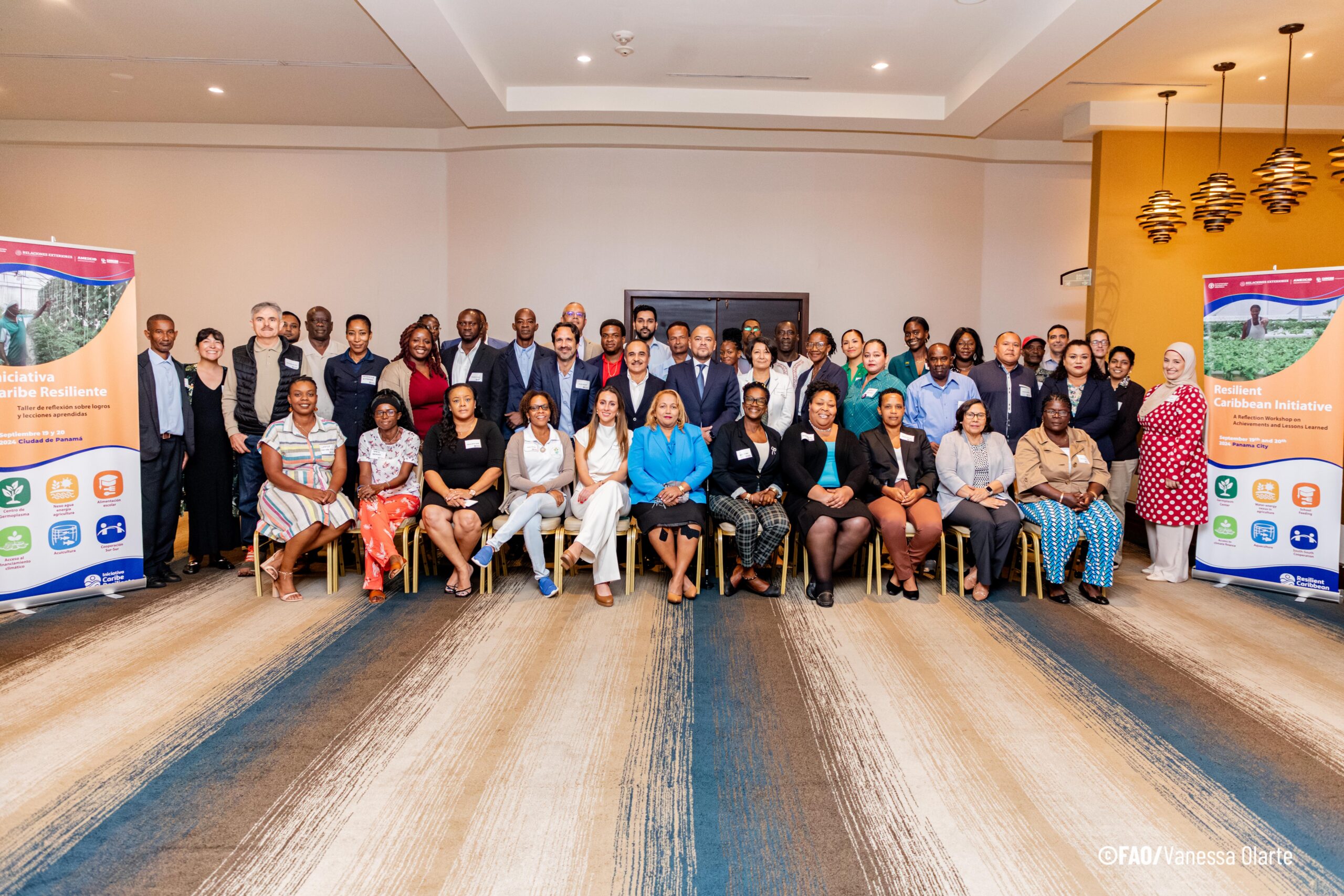
Within the framework of the Resilient Caribbean Initiative (RCI), funded by the Government of Mexico and implemented by the Food and Agriculture Organization of the United Nations (FAO) Subregional Office for the Caribbean in collaboration with relevant government ministries, the CARICOM Secretariat, and Mexican South-South cooperation partners, the “Reflection Workshop on Achievements and Lessons Learned ” was held in Panama City on September 19-20, 2024.
This event brought together representatives from various Caribbean countries, project beneficiaries, and key stakeholders to assess the progress and challenges in building resilience to climate change and other crises in the region. It also allowed to reflect on priorities for the future.
The workshop opened with remarks from Ms. Karen de Brouwer, Director of Financing for Development and Emerging Technologies at Mexico’s Ministry of Foreign Affairs (SRE), and Mr. Tony Rojas, General Director for the Execution of Projects Abroad of the Mexican Agency for International Development Cooperation (AMEXCID). Ambassador David Prendergast from the CARICOM Secretariat and Dr. Renata Clarke, FAO Subregional Coordinator for the Caribbean, were also present at the inauguration.
Dr. Clarke emphasized the significance of the event stating, “This event is of special importance as it brings our current project to a close. It provides us with a valuable opportunity to socialize our experiences, process the lessons we’ve learned, and forge a clear vision for future initiatives. The knowledge we gain here today will undoubtedly serve as the foundation for future projects that build on the successes of this one.”
The Initiative has trained 130 individuals in the water-energy-food nexus and installed 44 solar-powered irrigation and hydroponics systems. It improved kitchens at 26 schools and established 32 school gardens, providing training for teachers and students. Support was given to 28 MSMEs, two government facilities, and seven schools to expand aquaculture/aquaponics facilities. In Haiti, over 70 farmers were trained, and four satellite nurseries were equipped. Additionally, the Initiative mobilized over USD 50 million in climate finance from donors like the Global Environment Facility (GEF) and the Green Climate Fund (GCF).
During the “Voices from the Field” panel, Jamaican farmer Latoya Rattray-Ellis expressed gratitude for receiving a 1,000-gallon water storage tank and a solar-powered hydroponic system that can produce 400 seedlings. Sheir Williams from Antigua and Barbuda shared how a 5,000-gallon water storage cistern and solar-powered drip irrigation system significantly boosted her farm’s production. In Belize, Ms. Seleni Grajales, Principal of Santa Martha Public School, emphasized how the school feeding program has become a vital source of nutrition for students, improving their focus and energy for learning, while also nurturing their overall well-being.
The “National Perspectives” panel emphasized how the Initiative has strengthened climate resilience in agriculture, providing training, renewable energy solutions, and boosting school feeding and aquaculture programs. Mr. Osmond Harewood of the Barbados Agricultural Development and Marketing Corporation highlighted the Initiative’s role in building resilience in Barbados’ agricultural sector, stressing the importance of planning for timely equipment delivery.
During group discussions, participants noted achievements like increased use of solar technology and rainwater harvesting, which stabilized costs and boosted production during dry seasons. Challenges included limited production capacity, water shortages, crop theft, and project delays. Participants highlighted the importance of promoting local food production, adjusting crop schedules to climate conditions, and creativity in school menu design as key lessons learned.
On the second day the focus shifted to the future of the Resilient Caribbean Initiative. There was a strong consensus that while a solid foundation exists, the commitment of all stakeholders is crucial for sustained progress. Dr. Ulises Dehesa from the Mexican Institute of Water Technology emphasized the need to integrate water and energy solutions, highlighting the importance of community collaboration to ensure long-term sustainability and ownership.
In her keynote presentation, Ms. Catalina Torres outlined the success of Mexico’s National System for the Integral Development of the Family in implementing hot meal programs in schools, improving students’ access to nutritious foods. On his end, Dr. Bernardo Murillo, from the Center for Biological Research of the Northwest, showcased how integrated aquaculture systems could bolster food security and climate resilience in arid Caribbean regions. He emphasized that adopting these models could significantly enhance agricultural productivity and climate change mitigation efforts.
A high-level panel on regional cooperation for climate change adaptation featured representatives from AMEXCID, CARICOM, FAO, and Mexico’s diplomatic corps. The panel highlighted the importance of regional partnerships in enhancing agri-food system resilience. Ambassador Víctor Hugo Morales and Mr. Tony Rojas underscored Mexico’s commitment to cooperation in agriculture and food systems in the Caribbean. The door for a second phase of the Initiative was left open given the positive results achieved. These will be shared with the incoming administration, which was sworn in on October 1 2024.
Group discussions identified priority areas for future efforts, emphasizing the integration of renewable technologies, climate-smart practices, and the need for youth and gender inclusion to ensure a sustainable vision for the region’s agricultural future.
In closing the event, after giving thanks to the financial and technical support from Mexico through the Ministry of Foreign Affairs, AMEXCID, and South-South and Triangular cooperation partners, Jacinto Buenfil, FAO Project Coordinator of the Initiative stated that “the foundation exists to continue building on current achievements.” In agreement, participants expressed their request to the government of Mexico to continue supporting the Caribbean with a second phase of the Resilient Caribbean Initiative. (PR)
Agriculture
Caribbean countries made strides last year in dealing with hunger
CARIBBEAN AGRICULTURE FAO – Peter Richards
Latin America and Caribbean (LAC) countries have been able to reduce hunger among their populations last year, even as it increased significantly from 2019 to 2021 and the world has gone back 15 years, with hunger levels comparable to those of 2008-2009.
“The good news, if we can have a good news, is that Latin America and the Caribbean is the only one region to reduce hunger in the report that we presented during G20 (an intergovernmental forum comprising 19 sovereign countries, the European Union (EU), and the African Union (AU) and last year in the report that we presented in July in the United Nation in New York,” Mario Lubetkin, the Assistant Director General of the UN Food and Agriculture Organization (FAO) told the Caribbean Media Corporation (CMC) in an exclusive interview.
The “State of Food Security and Nutrition (SOFI) in the World,” which is an annual flagship report jointly prepared by FAO, the International Fund for Agricultural Development (IFAD), UNICEF, the World Food Programme (WFP) and the World Health Organization (WHO), showed that the percentage of hunger in Latin America and the Caribbean had risen from 5.6 per cent in 2019 to 6.9 per cent in 2021, but that there is a progressive reduction, reaching 6.2 per cent last year.
Mario Lubetkin, the Assistant Director General of the UN Food and Agriculture Organization (FAO) during his interview with CMC (CMC Photo)
Lubetkin said that this means that during the last two consecutive years, 4.3 million people have been recorded to stop suffering from hunger, mainly thanks to a recovery in South America.
“It’s good news, but we cannot be satisfied, because in the region, we are talking about 41 million people with hunger. So 4.3 million, it’s good news, but it’s not the news that we are waiting in the framework of, therefore, that all of us are doing to try to go to zero hunger in Latin America, the Caribbean,” he said, adding “we are so far than that sphere”.
Caribbean Community (CARICOM) countries have embarked upon an initiative to reduce their food import bill by 25 per cent by 2025 and in the process growing and producing much of the foods being imported into the region.
In March this year, Guyana’s President Dr. Irfaan Ali, who is spearheading the CARICOM initiative as the regional with lead responsibility for the agricultural sector in the quasi CARICOM cabinet, said the goal is currently at 70 per cent completion.
“A recent review, in February of 2024, puts our progress at close to 70% of our objective since starting the initiative three years ago,” he said then.
But the communique that followed the CARICCOM summit held in Grenada at the end of July, noted that by the first quarter of 2024, regional countries had recorded a 30 per cent achievement of targets set and a 12 per cent decline in real imports, equal to a quarter of a billion (US) dollars.
The summit also noted the development of a Regional Youth in Agriculture Strategy and the launch of the Regional Economic Agri-Insurance Programme (REAP) as positive steps toward building resilience and production.
In addition, the regional leaders also urged regional financial institutions to provide a special programme of support to the agriculture stakeholders and enterprises towards recovery and rehabilitation of the sector.
They also agreed to the adoption of a regional resilient Farmstead- Shadehouse Model geared towards the economic improvement of rural family farms. This model is adaptable to the specific circumstances of particular member states, according to the communique.
Lubetkin welcomes the CARICOM initiative to reduce the food import bill by growing the foods needed by its population saying the FAO is “talking with many countries in the region to try to facilitate process, to try to substitute import from outside to be produced here in the region”.
He said that he has already held discussions with officials in Guyana, Trinidad and Tobago, and The Bahamas.
“I met all the Prime Ministers of CARICOM two years ago. So we are working very closely…the point is this proposal to reduce imports, food imports, it’s a big challenge in which they are no one solution. There are many solutions”.
He gave as an example a world-wide project that is aimed at trying to better understand the production capacity in each country of the world.
Lubetkin said there is consensus to prepare “a big project about irrigation…because most of the countries in this region understand that irrigation is one of the key issues to try to prepare the condition…to increase or to develop the capacity of producing food”.
He said the project will be presented during the World Food Week that will be held at the FAO headquarters in Rome, October 14-19 this year bringing together various stakeholders including investors, banks and donors.
“I hope that that will be a very important moment to start a process in which we can have, together with the governments of the Caribbean…go in some points that are clever, that is managing water in the framework of increased capacity at the same time.
“To be very frank, we started to discuss with some governments, especially in South America, in which there are some food production problems, to try to understand how they can support, technically, investment, private and public, here in the Caribbean, because we don’t need to wait only from Europe, from China.
“That’s important. But we need to understand what we can do in the same region to try to develop better capacity together,” Lubetkin told CMC, noting that the latest FAO global report also indicated that in Central America for example, “climate change is a very, very big problem, like in the Caribbean, in which they invested a lot, but they couldn’t reduce the number of people with hunger.
“They didn’t increase, but it could reduce, like in South America, and in the Caribbean where there are many problems, like in other regions. But, you know, we can say climate change…and many other aspects in which the trend continues to increase hunger in this sub region.”
Lubetkin told CMC these are the issues he raised with some government in South America, underscoring the point that there is need for closer collaboration between Central, Latin and South America and the Caribbean.
“We need to increase the level and the impact of the project to try to create real impact for the region. This is an incredible region. This is a rich region. And I think that all of the region, Latin America, especially, need to support better the Caribbean, because we have the possibility in this region to have a concrete, successful example, that is possible to change the realities you alone, or no one alone, can do that. “
He said “something that we are talking in Latin America and in the Caribbean is to share better knowledge about food production, to share innovation, to share technology, not necessarily is money, because all this issue that I’m talking to it’s money, and direct innovation is money.
“Technology is money. Knowledge is money. So that’s the point in which it is critical that the other side of this region need to be more active.
“The region needs support from outside, but the point is to work inside, to prepare that what we are doing now, I want to put an example – 70 per cent of the trade of food in the world come from Latin America and the Caribbean,” Lubetkin told CMC, adding “we don’t say that we need to reduce this.
“What we say is maintain increase globally, but increase a little bit in the same region,” he said, hoping that countries in the region developing the same approach to food security, could help in that regard.
“I think that can be a good solution, if the development market in the region can invest here, that can support, for example, private player from the region, supported my finals here, linked with the strategy that you are doing, I think that is a quality change that we need….
The SOFI report showed that at the subregional level, hunger affected 5.2 per cent of the population in South America, 5.8 per cent in Mesoamerica and 17.2 per cent in the Caribbean.
In 2023, moderate or severe food insecurity in Latin America and the Caribbean was 28.2 per cent, slightly under the world’s average of 28.9 per cent and although it still affects 186.7 million people, 19.7 million managed to overcome this situation, in comparison to 2022.
A topic of attention is the double burden of malnutrition: obesity in adults shows an increase from 22.4 per cent in 2012 (91.4 million) to 29.9 per cent in 2022 (141.4 million). Mesoamerica is the subregion with the highest prevalence of obesity, standing at 34.4 per cent, followed by South America with 28.6 per cent and the Caribbean with 24.5 per cent.
Overweight in children under the age of five has escalated steadily since 2012, when it was 7.4 per cent (3.9 million), to 8.6 per cent in 2022 (4.2 million). This increase is mainly explained by what was observed in South America, where the prevalence stood at 9.7 per cent in 2022, almost two percentage points above 2021 levels.
In Latin America and the Caribbean, the cost of a healthy diet reached 4.56 purchasing power parities (PPP) dollars (One PPP dollar=US$0.007) per person per day in 2022, representing an 11.8 per cent increase compared to the value in 2021.
Caribbean governments have complained in the past of the various impediments that have hampered the socio-economic development of their countries, including trading intra regional trade and the decision by developed countries as well as international financial institutions to use other policies in making concessionary loans available to them.
Recently, Dominica’s Prime Minister Roosevelt Skerrit, addressing a symposium on agriculture for young people from the sub-regional Organisation of Eastern Caribbean States (OECS), spoke of the need to remove the various barriers to trade, particularly in agricultural products.
But, Lubetkin told CMC that his call for greater collaboration with other countries in the region, must be viewed differently, saying “for me, the most important thing is to start a new process…
“We have a new generation in the Caribbean, well prepared than others, than my generation, and we need to take in consideration very carefully this new approach with the new generation. But I want to highlight two examples in which I think and I’m optimistic, that we are going that way. I’m not saying that will be tomorrow”.
He said the Community of Latin American and Caribbean States (CELAC), a regional bloc of 33 Latin American and Caribbean countries had decided when St. Vincent and the Grenadines held the presidency of CELAC to approve by acclamation a new plan.
“So the new security plan, food security plan for the region, for 2024 to 2030. You can say that this is enough. No, it’s not enough,” he said, noting that CELAC has started a process in which all the 33 countries agree to try to build the process of security “because…this sustainable development goal theory need to conclude in 2031 to transform the world with zero hunger and zero poverty”.
He said he has been visiting several Caribbean countries signing an agreement for closer collaboration between the region and the FAO.
“But I want to say the following, in the last two years in the Caribbean, we signed this agreement. So, four years agreement. So, we do a long term policy. Because one of the problem that we all have…we run all the time for emergencies, and emergencies will not resolve the problem.
“We need to manage emergencies, emergencies in poverty, emergencies in climate change, but the same time, we need to to think beyond the emergencies to create resilience,” Lubetkin told CMC, adding “in these two years, I signed eight agreements in the region”.
“So, we are talking about nine countries in which together we discuss policy that go beyond what is happening today,” he told CMC.
Agriculture
Caribbean Chocolatiers participate in a Master Class to advance their chocolate-making skills
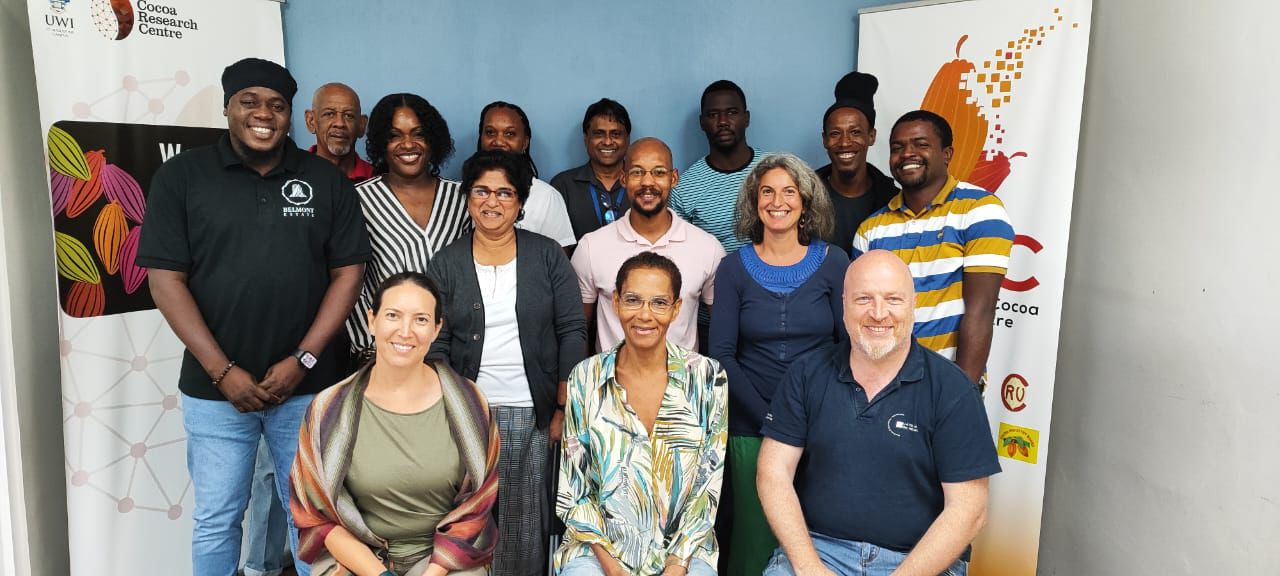
As part of its efforts to revitalize the Caribbean’s cocoa industry to enhance food security, the Food and Agriculture Organization of the United Nations (FAO) has been strengthening the sector’s foundations as a crucial undertaking. FAO in partnership with the University of the West Indies Cocoa Research Centre in Trinidad and Tobago hosted a Master Class in Chocolate Making for chocolatiers in the Caribbean.
The four-day workshop which was attended by chocolatiers from Saint Lucia, Dominica, Grenada and Trinidad and Tobago, was championed by Chef Régis Bouet, a renown chocolatier with 30 years experience as Research and Development Director of the French chocolate maker Weiss and finalist of the Meilleur Ouvrier de France chocolatier confiseur.
Throughout the workshop the participants gained an understanding of how quality is interconnected throughout the cocoa value chain, while developing an enhanced sense of taste, aroma and value-added products of chocolate, as well as linking with important workspace and equipment requirements. During the training, they learnt critical procedures and stages of roasting, use of cocoa butter and perfecting the art of the pre-crystallization process and understanding factors impacting taste and shelf life for high quality chocolate. Participants also learnt the science behind making ganache, panning techniques and different recipes for quality value-added products.
“I am really grateful for this opportunity. I’ve been learning a lot of new things about pre-crystallization and how chocolate is really made” stated Jamal Prince, a participant from Dominica. Jamal has been making cocoa cubes and powders, including instant cocoa beverage for 15 years, and started cultivating his own cocoa trees three years ago.
“The training was phenomenal and I learnt a lot of new techniques in chocolate making. It will help me get ready to export my products regionally and internationally”, expressed Maria Jackson, another participant and owner of Cacoa Sainte Lucie, a small business that produces gourmet chocolates in Saint Lucia. Her business started off in a small retrofitted garage, but has grown and evolved with a team of 15 employees, creating a wide range of cocoa-based products, including chocolate bars, bonbons, cocoa sticks, candles, soaps and more.
Anne Desrochers, Plant Production and Protection Specialist with FAO indicated that “The advanced master class on chocolate making was designed for Caribbean chocolatiers actively involved in chocolate making and cocoa processing, who were looking to enhance the quality of their products and share experiences with other chocolatiers”. The training covered critical aspects of quality chocolate making in addition to the commercial aspects of running a viable business. Ms. Desrochers expressed that this approach was particularly important to ensure the sustainability of businesses given that Caribbean Small Island Developing States (SIDS) are vulnerable to natural disasters.
Meanwhile, Chef Régis Bouet, spoke on the success of the workshop, He commented that, “What was intended to be a training course turned into a convivial moment of sharing with motivated people. I was delighted to give them as much as I could”.
“The critical aspects of cocoa processing and high quality chocolate confectionery were discussed through theory, demonstration sessions and hands-on practice. This highly anticipated training, which focused on key areas of skill set development for chocolate makers in the region, generated high interest and was very well received by participants from across the Caribbean”, she expressed.
Caption: Back rows: Caribbean Chocolatiers participants,
Front row: Anne Desrochers and Renata Clarke, FAO’s Subregional Coordinator and Chef Régis Bouet
According to the International Cocoa Organization (ICCO), the relatively small share of fine flavour cocoa world exports is estimated at approximately 12%, Latin America and the Caribbean being the main exporting region, accounting for 90% of the world exports. The balmy temperatures of the Caribbean islands are ideal for growing cocoa trees, and some of the world’s finest and most flavourable cocoa are produced in the region. (PR)
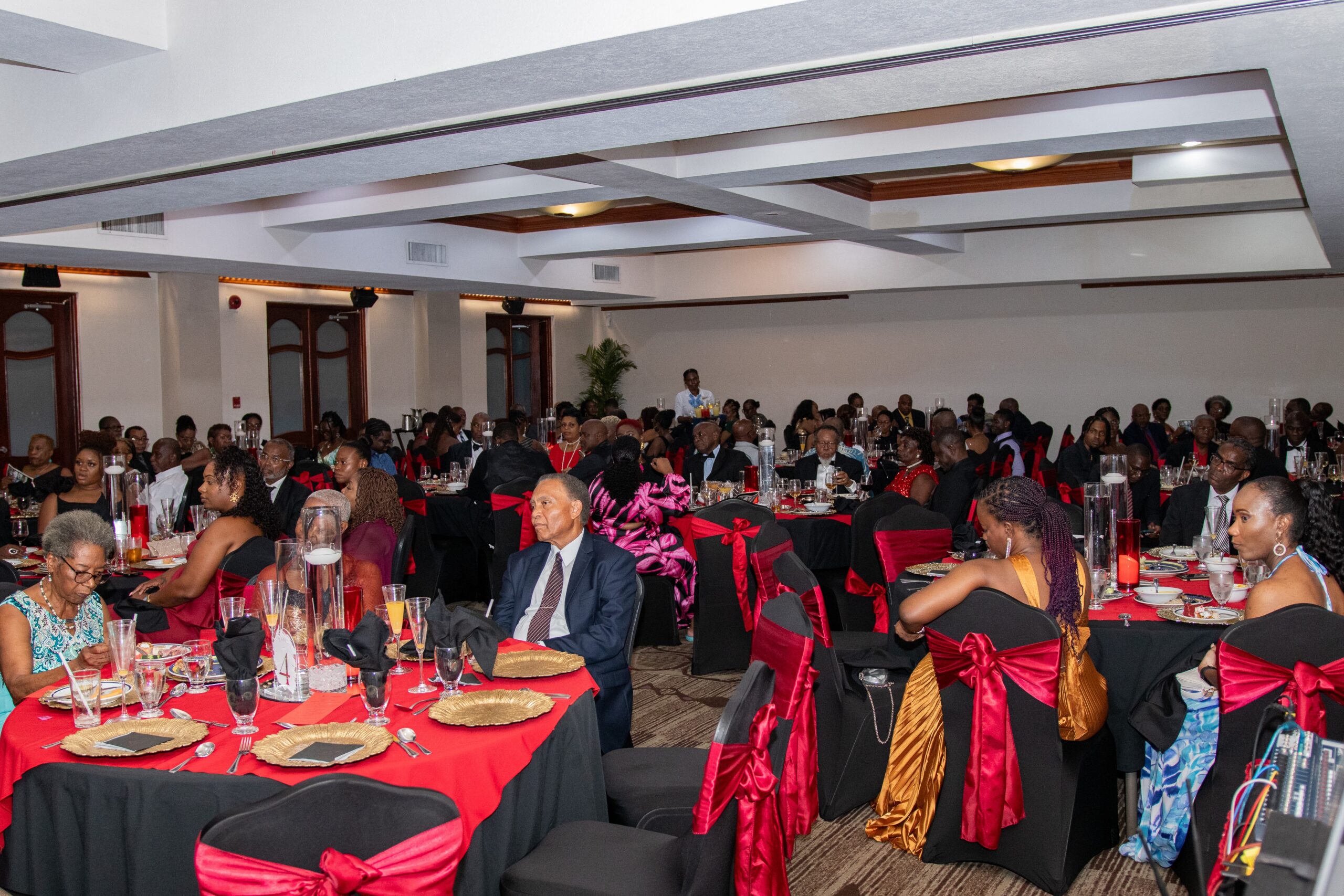
GALA DINNER CELEBRATES 40TH ANNIVERSARY

Dr Adrian Lorde speaks to Advo Magazine

American Airlines New York Service Returns To Barbados
Trending
-
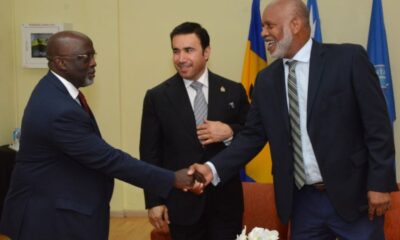
 International4 weeks ago
International4 weeks agoAG Marshall: Information & Intelligence Sharing Vital
-

 Business4 weeks ago
Business4 weeks agoVirgin Atlantic Appoints Sean Edwards as New Country Manager for the Caribbean
-

 Sports3 weeks ago
Sports3 weeks agoSPOONER NOMINATED FOR CANCO SPORT AWARD
-
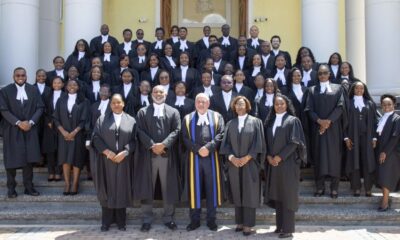
 Local3 weeks ago
Local3 weeks agoNew Lawyers Admitted To The Bar
-

 Tourism3 weeks ago
Tourism3 weeks agoBarbados To Showcase Investment Opportunities At CHICOS 2024
-

 International4 weeks ago
International4 weeks agoOne-China principle is consensus of international community
-

 International4 weeks ago
International4 weeks agoSENIORS CELEBRATED AT THE SOUBLE NINTH FESTIVAL
-

 Local3 weeks ago
Local3 weeks agoMinister Humphrey Leads Social Dialogue On Behalf Of Caribbean Region













